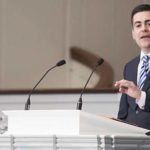WASHINGTON (RNS)—Not all Catholics appreciated Pope Benedict XVI’s staunch defense of Christian orthodoxy, traditional marriage and life from conception to natural death. But many American evangelicals sure did.
As word spread of Benedict’s resignation, many evangelicals lamented the impending loss of a powerful spokesman for their conservative causes.
“Pope Benedict XVI has exemplified moral courage and an unwavering commitment to the Gospel message,” said Ralph Reed, chairman of the Faith & Freedom Coalition, a conservative Christian political group.
 Ralph Reed“We honor him for his lifelong service to the Lord and his inestimable intellectual contribution to Christian orthodoxy.”
Ralph Reed“We honor him for his lifelong service to the Lord and his inestimable intellectual contribution to Christian orthodoxy.”
The high praise extended beyond U.S. borders as well.
“I appreciate his courage of ideas, even when they did not resonate with contemporary attitudes,” said Geoff Tunnicliffe, secretary general of the World Evangelical Alliance.
“I was especially moved by his boldness in warning us of the dangers of moral relativism and the tyranny of self-centered ideologies.”
Just a generation or two ago, such lavish praise might have been unthinkable. During the 1960s, evangelist Billy Graham—sometimes dubbed the Protestant pope — took heat for inviting Catholics to join his revivals.
But after the modernizing reforms of the Second Vatican Council in 1962-1965, denominational barriers fell and ecumenism prospered.
Sign up for our weekly edition and get all our headlines in your inbox on Thursdays
Meanwhile, evangelicals developed an appreciation for Catholic culture, and Catholics found ready evangelical allies in the battles against secularism, abortion and gay rights.
“One of the challenges of evangelical Protestantism as it became a political force was to find a vocabulary to talk about the role of Christian faith in a diverse, pluralistic society like the United States,” said R.R. Reno, executive editor of First Things, an interreligious journal. “By and large, they turned to Catholicism.”
The founder of First Things, the late Richard John Neuhaus, was a key figure in bridging the gap between Catholics and evangelicals. Along with the late evangelical activist Charles Colson, he formed Evangelicals and Catholics Together in 1994, a group that bonded, in part, over shared admiration for the late Pope John Paul II.
“We rejoice together that the Roman Catholic Church—as affirmed by the Second Vatican Council and boldly exemplified in the ministry of John Paul II—is strongly committed to religious freedom and, consequently, to the defense of all human rights,” the group wrote in a manifesto that quotes John Paul three times.
More recently, Catholic, evangelical and Orthodox leaders backed the “Manhattan Declaration” in 2009, a document that professes common support for “the sanctity of life, traditional marriage and religious liberty.”
The political fruits of evangelical-Catholic marriage might be seen in the presidential candidacy of Rick Santorum, who enjoyed strong backing from evangelicals, even as he struggled to connect with Catholics.
But that’s not to say that evangelical leaders are about to “swim the Tiber,” as they say, and convert to Catholicism.
 Al Mohler“At least one of the many faults of the papacy is the idea that a monarchical head can speak for any church,” tweeted Al Mohler, president of Southern Baptist Theological Seminary in Louisville, Ky.
Al Mohler“At least one of the many faults of the papacy is the idea that a monarchical head can speak for any church,” tweeted Al Mohler, president of Southern Baptist Theological Seminary in Louisville, Ky.
Still, Mohler balanced his doctrinal critique with the kind of praise that is the hallmark of this “ecumenism of the trenches” among allies in today’s culture wars.
“Pope Benedict has offered a brave and intelligent defense of truth against a relativist tide,” he tweeted, “and he has been a stalwart friend of life.”
When Benedict visited New York and Washington in 2008, evangelical theologian and Fuller Seminary President Richard Mouw said the pope “has an important pastoral role in the broader Christian community.”
“In many ways and on many subjects, he speaks for me,” Mouw wrote.
 Russell MooreRussell Moore, dean of the School of Theology at Southern Baptist Theological Seminary, said evangelicals might be tempted to view Benedict as the retiring coach of a rival football team. That’s a far cry from another metaphor from the New Testament book of Revelation many evangelicals once used for the papacy—Mother of Harlots.
Russell MooreRussell Moore, dean of the School of Theology at Southern Baptist Theological Seminary, said evangelicals might be tempted to view Benedict as the retiring coach of a rival football team. That’s a far cry from another metaphor from the New Testament book of Revelation many evangelicals once used for the papacy—Mother of Harlots.
But things have changed, Moore said, and evangelicals need all the allies they can get. Benedict spoke up for persecuted Christians around the world, countered “soul-decaying secularism” and defended the dignity of human life, said the evangelical scholar.
“As Protestant Christians, we will disagree with this Pope, and with the next one, on all sorts of things,” Moore wrote on his blog.
“But let’s pray the next pope, like this one, will remember what it means to be human, and will remind the rest of us when we forget.”














We seek to connect God’s story and God’s people around the world. To learn more about God’s story, click here.
Send comments and feedback to Eric Black, our editor. For comments to be published, please specify “letter to the editor.” Maximum length for publication is 300 words.